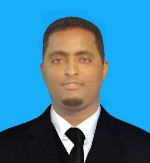in small and medium construction companies in Hargeisa
FEATURED PAPER
By Adebayo Adeboye Fashina1,2*, Mohamed Hassan Ahmed1, Jama Adam Salah3, and Funke Folasade Fakunle4
1Project Management Program, School of Graduate Studies and Research, Gollis University, 26 June District, Hargeisa, Somaliland.
2Engineering Management Program, School of Graduate Studies and Research, Gollis University, 26 June District, Hargeisa, Somaliland.
3Telecommunication Engineering Department, Gollis University, 26 June District, Hargeisa, Somaliland.
4Compliance and Auditing Department, AdeFolasade Management Systems Consults, Lagos-Nigeria.
*Corresponding author: Adebayo Adeboye Fashina. adebayofashina@gmail.com
Abstract
This study investigates the significant challenges associated with the implementation of project management in small and medium construction companies in Hargeisa. Before the questionnaire design, a detailed literature review was carried out to identify 15 possible factors that upset the implementation of project management practices in small and medium construction companies. A questionnaire survey design was then used to obtain data from 30 small and medium construction stakeholders selected based on simple random sampling. Feedbacks from the respondent was then analyzed using SPSS Statistics Software and Microsoft Excel Packages. This was attained by calculating the Cronbach’s Alpha, mean values and Relative Importance Index (RII), respectively, for reliability check and ranking purposes. The results from the study show that unrealistic timeline (RII = 0.813), inadequate understanding of project and product scope (RII = 0.807), poor communication/miscommunication (RII = 0.800), and misestimating expenses (RII = 0.773) are the four most significant challenges faced by small and medium construction companies when implementing project management, respectively. This study will be of high relevance to policy-makers in both the public and the private sector, since the implementation of project management practices is increasingly becoming a vital subject matter of discussion in developing economies like Somaliland. This study also proffers recommendations on the appropriate project management procedures that can help the partners of the Somaliland government manage the identified key challenges when developing programs for funding of activities that is targeted at advancing the performance of SMEs in Somaliland.
Keywords: Project Management, Barriers/Challenges, Small and Medium Construction Companies, Low- and Medium Income Countries, Organizational Performance, Hargeisa-Somaliland
- Introduction
Over the years, the global construction industry has continued to experience an increasing changes year after year as a result of novel technologies, new or heightened management system, and the need to expand construction activities to attain organizational objectives [1]–[3]. This has led to the use of project management practices and processes in the industry [4]–[7]. Although, there are numerous reasons while organizations embrace project management practices, project management principles and practices are seen as a vital part of any successful project in the industry [4], [5], [8] and its impact in the sustainable development of many businesses and countries, over the years cannot be overemphasized [9]–[12]. This can be linked to the fact that construction projects significantly contribute to the strategic direction of any establishment in the industry, be it large organizations or small and medium-enterprise (SMEs) [13]–[15]. Despite this, a large number of construction and building projects are still faced with delay in completion while some suffer unavoidable cost overrun and others experience poor efficient qualities [16].
Furthermore, SMEs have increasingly been seen as a major driver of socioeconomic growth and development for African countries [17]. Asides its commitment to the growth of the gross domestic product (GDP) of several African countries, SMEs represent approximately half of the jobs in these countries. For example, SMEs account for 33 % of the GDP of Tanzania, 33 % of the GDP of Ghana and 52-57 % of the GDP of South African. Besides this, SMEs sums up about 70 % of Nigeria’s parts assembling sector and 91 % of formal business in South Africa [18]. One can therefore argue that an adequate support in the development of SMEs that are innovative- and creative-based can have a direct or indirect impact on domestic and global markets [19], [20]. This is why all sectors of most economies have an increasing interest in advancing SMEs [21]–[23].
Moreover, small and medium construction companies assume a distinct part in this progressive development, as they serve as a source of job creation [24], [25]. In fact, they contribute to the sustenance of the standard of life by increasing the average wages of the general public [25]. As such, small and medium construction companies have a significant obligation in the development and attractiveness of the economy low- and medium-income countries [26], [27]
In spite of this, small and medium construction companies are constantly faced with major concerns regarding the sustenance of an improved market share within a rigid competition among companies dealing with parallel services [28]. This is because customers/clients/owners are now seeking for high-quality products/services that can be achieved within a short duration at inexpensive prices. However, the constant growth and changes in the world of business in recent time require a strategic approach in organizing and managing small and medium construction companies for sustainability [15], [29].
Consequently, private and public SMEs (including construction companies) in many developing countries have invested profoundly in their businesses in an effort to attain this fundamental need. Yet, quite a number of these enterprises in the last decade are unable to yield the anticipated outcomes [30]–[32]. Nevertheless, on one hand, suggestions from practice and findings from prior research works show that successful feat attained by several organizations in recent years including SMEs can be traceable to their capability to manage several projects more strategically through project management processes which in turn upsurges the effectiveness of such SMEs or organizations [29], [33]. On the other hands, in most low- and medium-income countries, majority of these SMEs particularly, those in the public sector are faced with challenges when implementing project management in their projects. Within this context, the small and medium construction companies in least developing countries need to pay additional attention to project management practices in order to sustain market share and safeguard return on investment, profitability and client demands. As such, it therefore clear that there is a need to explore the challenges encountered in the course of implementing project management in small and medium construction projects in low- and medium-income companies.
More…
To read entire paper, click here
How to cite this paper: Fashina, A. A., Ahmed, M. H., Salah, J. A., Fakunle, F. F. (2020). The major barriers to the implementation of project management in small and medium construction companies in Hargeisa; PM World Journal, Vol. IX, Issue IX, September. Available online at https://pmworldlibrary.net/wp-content/uploads/2020/08/pmwj97-Sep2020-Fashina-Ahmed-Salah-Fakunle-major-barriers-to-PM-in-small-medium-construction-companies.pdf
About the Authors

Dr. Adebayo Adeboye Fashina
Hargeisa, Somaliland
![]()
Dr. Adebayo Adeboye Fashina is a young certified management consultant (CMC), professional researcher, educator and education management consultant with over nine years of significant international experience working on STEM education, EOMS/Project management research and teaching, science research and teaching, and capacity building at various levels of education across Africa.
Dr. Adebayo hold a Bachelor’s degree in Physics/Electronics, MSc. in Theoretical Physics and Ph.D. in Theoretical and Applied Physics. He currently works with Gollis University, Hargeisa as an Associate Professor of Physics and Engineering Management. Prior to his present job, he worked as a Researcher/GTA/Lecturer-B at AUST before joining Kampala International University, Uganda as a Senior Lecturer and later worked as an Associate Professor at William V. S. Tubman University, Liberia. He was nominated for the 2016 Sustainable Energy Africa Awards and shortlisted as one of the three finalists in the ”Emerging Leaders” award category at the 2016 Nigeria Energy Forum.
Dr. Adebayo has conducted training workshops, seminars and given speeches/talks/presentations at local and international conferences. He has published more than 20 articles in reputed journals and is an active reviewer of many international journals. He is a motivated, energetic and focused individual with strengths in innovative teaching approaches, interdisciplinary research, data analysis, teacher training and team management. His research interest includes sustainable living, project management, RE policy and management, education organization management system (EOMS), educational planning, photonic nanostructures of materials etc. He is a fellow of African Scientific Institute, USA and the Institute of Management Consultants, Nigeria.
Dr. Adebayo can be contacted on adebayofashina@gmail.com or afashina@gollisuniversity.org

Mohamed Hassan Ahmed
Hargeisa, Somaliland
![]()
Mohamed Hassan Ahmed is a member of Dr. Adebayo’s research group at Gollis University. Mohamed hold a B.Sc. degree in Environmental Science and Master of Arts in Project Management from University of Hargeisa and Gollis University, Hargeisa, respectively. His research interests evolve around application of project management knowledge areas to small and medium enterprises (SMEs). Mohamed can be contacted on nuuradiin444@gmail.com

Jama Adam Salah
Hargeisa, Somaliland
![]()
Jama Adam Salah is a young project & power system engineer, researcher and educator with over 3 years of significant experience working on telecommunication projects, data centers, base stations, renewable energy technology projects and so on. He holds a bachelor degree in Telecommunication Engineering with the honors from Gollis University, Somaliland, a Postgraduate Diploma in Education Management and Higher Teaching from Islamic University, Uganda (IUIU), Kampala, Uganda and a Master of Science in Electrical Engineering (Power and Energy option) from Kampala International University, Kampala, Uganda.
Prior to his current job with Amtel Telecom, Puntland, Somalia, as a Power Systems Engineer, Jama worked as a Part-time lecturer at Gollis University, University of Hargeisa and others before joining Renewable Energy Hub Co, as a Project Engineer and Manager. He has since been involved in Mega project across East Africa particular, Somalia. He is proficient in project proposal writing, project cost analysis training, and the use of Microsoft Office packages such as MS Word, MS Excel, and MS Power point. His research interest includes the design and simulation of RET projects, project management practices in telecommunication and construction industries etc.
Jama can be contacted on engr.jama@gmail.com

Funke Folasade Fakunle
Lagos Nigeria
![]()
Funke Folasade Fakunle is a young female NEBOSH international diploma qualified professional with 10 years of significant QHSE experience in QHSE management, training and consultancy. Being passionate about Health, Safety and Environment (HSE) and management system in the workplace, she has acquired certifications in Process Safety: Hazard Operability study (HAZOP), Lean six sigma (Green Belt Holder), ISO 9001 Lead Auditor, OHSAS 18001 Lead Auditor, AOFAQ Level 3 Award in Education & Training, NEBOSH International Diploma in Occupational Safety and Health, NEBOSH International General Certificate in Occupational Safety and Health, Project Management, Rigging Safety and Inspection etc.
Funke received a B.Sc. degree in Mathematics from the University of Uyo, Akwa-Ibom, Nigeria in 2008. Over the past 10 years, she has gained significant QHSE experience in various industries. These include construction, oil & gas, logistics and transportation, telecommunication, manufacturing, banking and security sectors. She is a register Professional/Associated Member of the International Register of Certificated Auditors (IRCA), International Institute of Risk and Safety Management (IIRSM), and Society of Petroleum Engineers (SPE).
As an QHSE Consultant/Trainer at present, she conducts QHSE training, consulting and auditing/evaluation exercises that help improve the QHSE Management Systems of various organizations. This allows her to adequately provide her clients with the necessary advisory services that include but not limited to HSE employee orientation training, development, planning and implementation of QHSE Management Systems, QHSE auditing, Environmental Management System, process improvement and so on.
Funke can be contacted on funkefolasade7@gmail.com









